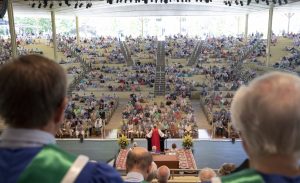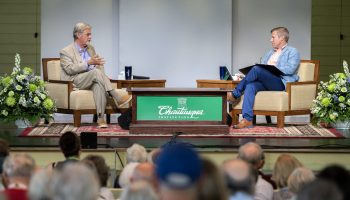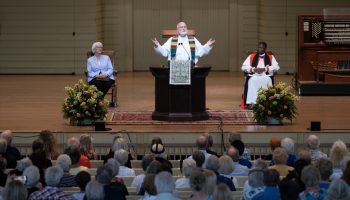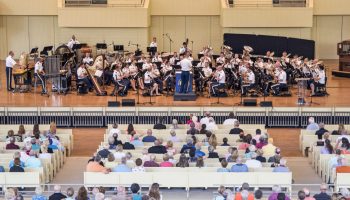
Several Homeboys gave Fr. Greg Boyle, S.J. some advice about public speaking before he came to Chautauqua.
“If you are humble, you will never stumble,” Roberto told him.
“Fake it ’til you make it,” Jose said.
“You know, you gotta pepper your talk with self-defecating humor,” Luis said.
“No shit,” Boyle said. “Since I work with gang members, I know how to talk to Chautauquans.”
The congregation laughed.
Boyle preached at the 10:45 a.m. Sunday morning, July 15, ecumencial service of worship in the Amphitheater. His sermon title was “The Whole Language,” and his Scripture text was Mark 6:7-13, Jesus’ sending of the 12 disciples to confront unclean spirits.
Jesus sent the disciples out two by two, Boyle said.
“We are not supposed to do it alone,” he said. “One Christian is no Christian. Only in community can we move into the world with authority.”
He told the congregation that Jesus formed friendships, and relationships, and then a community before he sent the disciples into the world.
“The world gets changed by what we focus on,” Boyle said. “We go to the margins to erase the margins. We choose to stand with the excluded and demonized.”
Boyle said that the early Christian community was noted for its practice of kissing one another full on the lips. In that time, “You only did that with blood relatives. This was a sign that something more spacious, expansive and inclusive was going on.”
In an interview, Whoopi Goldberg was asked who was the person now living that she most admired. She answered Pope Francis because he was “going with the original program.”
“We know the original program,” Boyle said. “It takes seriously what Jesus said about inclusion, non-violence, loving, kindness and compassion.”
The early Christians did not go out to create an institution to be defended against the outside. It was a movement, Boyle said, “that showed tenderness, a loving way of life, that was articulated in compassion that God would recognize.”
He quoted St. Teresa of Avila, that “when we build a shrine where all are welcome, God will sing loud enough to be heard.”
Boyle was at a conference, and one of the exercises the participants were asked to engage in was to imagine standing in a grocery line and turning to the person behind you to initiate a conversation about Jesus.
“Yikes. I would move my 26 items to the express line,” Boyle said. “We are a culture that lectures rather than listens. If we are humble, we will stop addressing the culture with words. In these polarized times, when thoughtlessness passes for authority, and cruelty as truth, there is too much no and not enough yes.”
He said the disciples went out as water to one land that was thirsty and one land that was on fire.
“They made the boundaries tremble,” Boyle said. “We need a new model, what Pope Francis called a ‘revolution of tenderness.’ ”
Boyle was asked to go to an immigration hearing for Joey, a Homeboy who had been brought to the United States by his mother from Uzbekistan. Joey had joined a gang, gone to jail and was now in his late 20s. The government wanted to deport him back to Uzbekistan.
During the hearing, Joey kept interrupting Boyle’s testimony. First, he called out to remind Boyle that he had been an altar boy for him and then that “I made my first commotion with you.” That was not his last, Boyle noted.
Boyle asked another homeboy, Louie, about Joey. They had been in the same gang, and Louie told Boyle, “Oh, you mean the Russian boy.” They shared a cell, and when Joey would call his mother, Louie said, “He talked to his mama in Russian. Man, he spoke the whole language.”
Boyle said the church had wandered away from speaking “the whole language.”
“We have cut ties with Jesus,” he said. “People long for the original program, to find their true selves in a loving community.”
People are looking to find the marrow of the true gospel, he said.
“People are looking for open hearts, for warm and affectionate community that resists scapegoating and humanizes each other,” he said.
Almost 15,000 people pass through Homeboy Industries each year.
“They can imagine a future and cease to plan their funerals,” Boyle said. “They stand on a porch and see what they all long for, the opposite of what has been, a place where enemies stand side by side making croissants.”
Theologian Brian McLaren called this organizing religion, not organized religion, that returns people to themselves.
“At Homeboys, we don’t hold up a bar that people have to measure up to; we hold a mirror up and tell them the truth — you are exactly what God had in mind when God made you,” Boyle said. “Prison, bullets and death can’t touch you. We stand against forgetting that we belong to each other.”
Boyle said that his alma mater, Gonzaga University, “forces students to read my book, Tattoos on the Heart.” The university invited Boyle to speak and to bring two Homeboys with him.
Boyle, who said he likes to mess with the heads of the Homeboys and the congregation, always brings two Homeboys who have been in rival gangs, so they have to share a hotel room, and who have never flown, to watch their panic in the skies.
One time, Boyle was flying out of the Los Angeles airport and one of the homeboys said, “Are we flying Virgin Airlines because it’s my first time?”
“Yes,” Boyle replied, “and it is a requirement to fly home on American.”
On this trip, he took Mario and Bobby. Mario was afraid to fly and panicked even in the terminal at the Burbank airport where there are no jetways to the planes. When Mario asked how long it would be before they would board, Boyle pointed to two flight attendants going up the stairs with Starbucks coffee cups in their hands.
“We can board just as soon as they sober up the pilots,” he said.
Mario, Boyle said, has more tattoos than anyone in the 30-year history of Homeboy Industries. Yet he is the kindest, most gentle soul.
“Mario is proof that only the soul that vibrates with tenderness has any chance to change the world,” Boyle said.
Mario and Bobby told their life stories at Gonzaga, and then Boyle spoke and they took questions. A woman stood up and asked Mario, who has a son and a daughter, what wisdom he would share with them.
Mario choked up.
“I just don’t want my kids to grow up to be like me,” he finally blurted out.
“Why not?” the woman asked. “You are loving, kind, gentle and wise. I hope they turn out to be just like you.”
“One thousand people stood up and would not stop clapping,” Boyle said. “Mario was overwhelmed. She returned him to himself and by an exquisite mutuality, he returned the crowd to itself.”
There is one land that is thirsty, one land that is on fire, and we all need water, Boyle said.
“We are all sent to speak the whole language, armed with tenderness, giving wet kisses to everyone, with exquisite mutuality,” he said. “At the shrine where all are welcome, God will sing loud enough to be heard.”
The Rt. Rev. V. Gene Robinson, vice president of religion, presided. Angela James, president of the Bird, Tree & Garden Club, read the Scripture. The choral introit was “Bless the Lord, O My Soul” by Mikhail Ippolitov-Ivanov from the Liturgy of St. John Chrysostom, Op. 37/ii. Pati Piper and Peter Steinmetz served as cantors for responsorial Psalm 100, “We are God’s People,” by David Haas. The choral response to the morning prayers was “Lead Me, God” by Pavel Chesnokov. The offertory anthem was “When I Survey the Wondrous Cross,” setting by Dan Forrest to an English/Irish tune “O Waly Waly.” Rebecca Kemper Scarnati served as oboe soloist. Jared Jacobsen, organist and coordinator of worship and sacred music, directed the Chautauqua Choir. Toccata for Organ (Uzbek Suite, II) by Gyorgi Aleksandrovich Mushel was the organ postlude. The Alison and Craig Marthinson Endowment for the Department of Religionprovides support for this week’s services.




